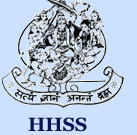| After
completing his high school course—he was an old boy of
the Hindu High School—Sri A.Subba Rao joined the Presidency
College, Madras, and passed out of it taking the B.A.degree
in Philisophy.
He began his official carrer as Head Quarters Inspector
of Police, Madura. In a few years he rose to the position
of Assistant Superintendent of Police and worked in Coimbatore,
Salem and Guntur districts. His devotion to duty and his sterling
character soon brought him the coveted post of District Superintendent
of Police, a post not ordinarily given to Indians in those
days. Soon after his services were lent to the Cochin Durbar.
He served in Cochin State for about seven years as head of
the Police Department. In addition he held the post of "Commandant,
Nayar Brigade." He effected many reforms in the Police
Department then and brought it to a high level of efficiency.
Sri A.Subba Rao accompanied His Highness the Raja of Cochin
to the Delhi Durbar in the year 1904. After the grand ceremony
was over, His Highness went on a pilgrimage to Gaya, Benares
and other sacred places in Northern India. Sri A.Subba Rao
had the rare fortune of visiting holy places in company with
the Royal party. During this tour, on many occasions, persons
not knowing the English language came to His Highness for
interview and Sri Rao made himself useful as interpreter on
such occasions.
After reversion to British service from Cochin State he
worked in Guntur, South Canara and South Arcot districts.
After retirement he settled down at Madras. He was connected
with various institutions such as the United India Life Assurance
Co., Ltd., Madras, S.M.S.O. Nidhi, S.M.S.O. Sabha, Tiruchanur
(near Tirupathi), Hindu High School, etc.
He led a simple, unostentatious life. He was easily accessible
to all and he was always ready to help people to the best
of his ability. He talked in such a manner that even strangers
felt quite at home in his presence.
Whenever he went to the mofussil on holiday trip, he was
particular about meeting his friends and relatives, especially
the poor ones. He also paid visits to the abodes of learned
pandits and enjoyed their company and conversation.
Though he himself led a regorous life of descipline, his
ioutlook on religion was liberal. He never imposed his views
on others living with him, but allowed them a great deal of
latitude. He was a guiding star to the Madhwa community.
His death on 11th October 1949 was a great loss to the Hindu
High School. He had been a member of the school committee since
1919 and he attended all the meetings of the Committee except
the one held in August 1949 when he fell ill, from which he
did not recover. His love for the school was so great that he
atternded all the school functions, even in his old age. The
teachers of the school committee with a portrait of his, in
fitting recognisition of the services he rendered to the school
for over thrity years as member, Secretary and President of
the Hindu High School Committee.
|
